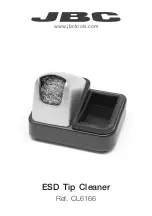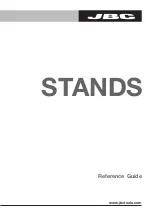
English
10
Wall Mounting
Some CRAFTSMAN chargers are designed to be wall
mountable or to sit upright on a table or work surface. If wall
mounting, locate the charger within reach of an electrical
outlet, and away from a corner or other obstructions which
may impede air flow. Use the back of the charger as a
template for the location of the mounting screws on the wall.
Mount the charger securely using drywall screws (purchased
separately) at least 1” (25.4 mm) long, with a screw head
diameter of 0.28–0.35” (7–9 mm), screwed into wood to an
optimal depth leaving approximately 7/32” (5.5 mm) of the
screw exposed. Align the slots on the back of the charger
with the exposed screws and fully engage them in the slots.
nOTE:
Do not attempt to mount CMCB101 charger under a
bench or table.
nOTE:
Only mount CMCB101 charger with the charging
lights pointed upward toward the ceiling.
VersaTrack™
WARNING:
Do not charge batteries while charger is
hung on Trackwall.
Electronic Protection System
Li‑Ion tools are designed with an Electronic Protection
System that will protect the battery pack against overloading,
overheating or deep discharge. The tool will automatically
turn off and the battery pack will need to be recharged.
Important Charging Notes
1. Longest life and best performance can be obtained if
the battery pack is charged when the air temperature
is between 65 °F – 75 °F (18 ° C– 24 °C). DO NOT charge
when the battery pack is below +40 °F (+4.5 °C), or
above +104 °F (+40 °C). This is important and will
prevent serious damage to the battery pack.
2. The charger and battery pack may become warm to the
touch while charging. This is a normal condition, and
does not indicate a problem. To facilitate the cooling of
the battery pack after use, avoid placing the charger or
battery pack in a warm environment such as in a metal
shed or an uninsulated trailer.
3. If the battery pack does not charge properly:
a. Check operation of receptacle by plugging in a lamp
or other appliance;
b. Check to see if receptacle is connected to a light
switch which turns power off when you turn out
the lights;
c. If charging problems persist, take the tool, battery
pack and charger to your local service center.
4. You may charge a partially used pack whenever you
desire with no adverse effect on the battery pack.
Charger Cleaning Instructions
WARNING:
Shock hazard. Disconnect the charger
from the AC outlet before cleaning. Dirt and grease
may be removed from the exterior of the charger using
a cloth or soft non‑metallic brush. Do not use water or
any cleaning solutions.
•
Do not place any object on top of the charger or place
the charger on a soft surface that might block the
ventilation slots and result in excessive internal heat.
Place the charger in a position away from any heat source.
The charger is ventilated through slots in the top and the
bottom of the housing.
•
Do not operate the charger with a damaged cord
or plug.
Have them replaced immediately.
•
Do not operate the charger if it has received a sharp
blow, been dropped or otherwise damaged in any
way.
Take it to an authorized service center.
•
Do not disassemble the charger; take it to an
authorized service center when service or repair
is required.
Incorrect reassembly may result in a risk of
electric shock, electrocution or fire.
•
The charger is designed to operate on standard
120V household electrical power. Do not attempt to
use it on any other voltage.
This does not apply to the
vehicular charger.
•
Foreign materials of a conductive nature, such as, but
not limited to, grinding dust, metal chips, steel wool,
aluminum foil or any buildup of metallic particles
should be kept away from the charger cavities and
ventilation slots.
•
Always unplug the charger from the power supply
when there is no battery pack in the cavity.
Charging a Battery (Fig. E)
1. Plug the charger into an appropriate outlet.
2. Insert and fully seat battery pack. Green charging light(s)
will continuously blink while charging.
3. Charging is complete when the green charging light(s)
remain(s) continuously ON. Battery pack can be left in
charger or removed.
WARNING:
Only charge batteries in air temperature
over 40 ° F (4.5 ° C) and below 104 ° F (+40 ° C).
4. Charger will not charge a faulty battery pack, which may
be indicated by the charging light(s) staying OFF. Take
charger and battery pack to an authorized service center
if light(s) stay(s) OFF.
nOTE:
Refer to label near charging light(s) on charger for
blink patterns.
nOTE:
To remove the battery pack, some chargers
require the battery pack release button to be pressed.
hot/Cold Pack Delay
When the charger detects a battery pack that is too hot
or too cold, it automatically starts a Hot/Cold Pack Delay,
suspending charging until the battery pack has reached an
appropriate temperature. The charger then automatically
switches to the pack charging mode. This feature ensures
maximum battery pack life.
A cold battery pack may charge at a slower rate than a warm
battery pack.
The hot/cold pack delay will be indicated by the green
light(s) continuing to blink but with the red light
continuously ON. Once the battery pack has reached an
appropriate temperature, the red light will turn OFF and the
charger will resume the charging procedure.
Summary of Contents for CMCE030
Page 5: ...3 Fig G 8 Fig H 8 17 18 ...
Page 43: ......













































